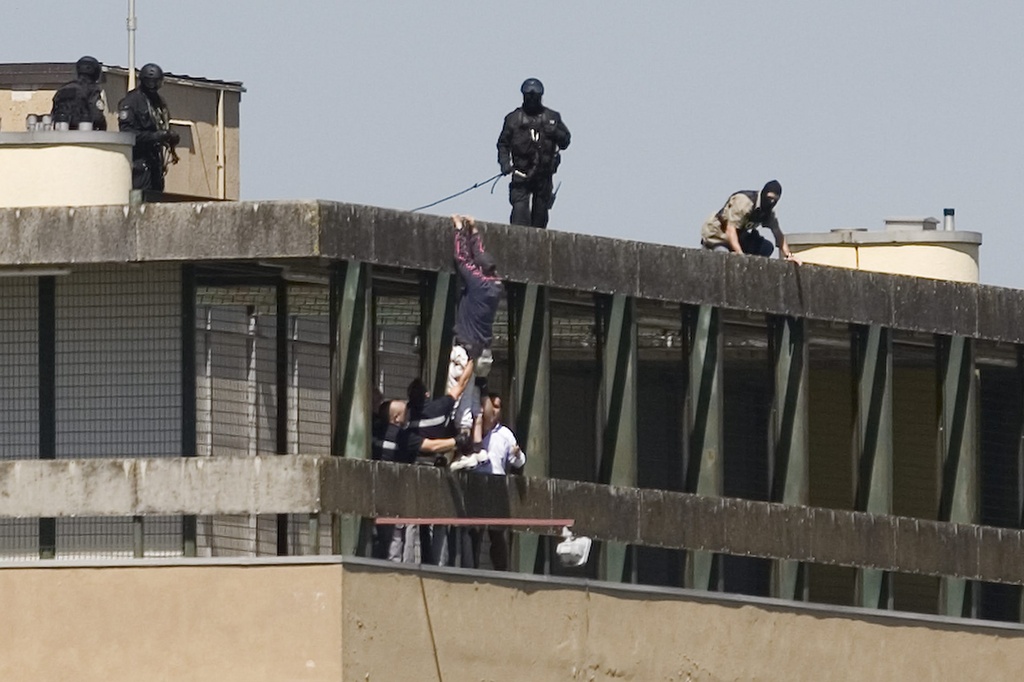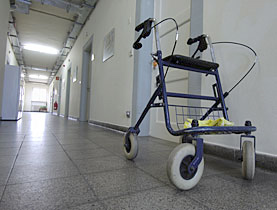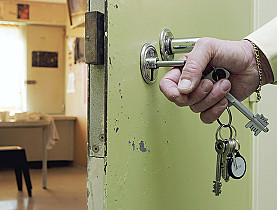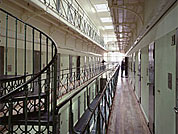Prison inmate’s death raises questions

In the early hours of March 11 an inmate in a prison in western Switzerland suffocated in his cell after setting fire to his mattress. Help came too late.
The fall-out has been immense. Inquiries have been opened into various aspects of the case and politicians in canton Vaud have been at each other’s throats.
Readers’ letters to newspapers have been full of recriminations and the media have feasted on leaks surrounding the story.
In one such leak, Le Matin newspaper published clips of a telephone conversation on the night of March 11 between prison guards and police. The clips were rebroadcast by France’s top radio station RTL on Monday under the headline: “An inmate died in his Swiss cell as the prison guards laughed.”
On Tuesday a group of around 20 inmates at another prison in nearby Lausanne staged an eight-hour protest in support of the dead man’s family, refusing to go back to their cells after their morning exercise.
On the night in question, S.V.* started the fire after an argument with guards. For reasons that are still unclear, help did not arrive for 30-90 minutes, according to different versions of the story. The inmate – who had spent 12 of his 30 years locked up – died of smoke inhalation in his cell in the high security prison in Bochuz.
“This tragedy saddens me because it was bound to happen and unfortunately I don’t think it will be the last,” commented Jean-Pierre Restellini, member of the European Committee for the Prevention of Torture and chairman of the National Commission for the Prevention of Torture.
“Wild animals”
Whatever the outcome of the investigations, one thing is certain for Restellini: however dangerous the man was, his place was in hospital and not prison, let alone a high-security jail and serving an indeterminate sentence that had been extended every year since 2001.
Transferred 23 times, he had seen the inside of every Swiss prison. And yet he had not had a psychiatric assessment for seven years.
“If I were a magistrate I would open an investigation into negligent homicide,” said Jean-Marie Crettaz, a Geneva lawyer.
“The whole system is wrong: it puts people in prison, psychiatric reports are somewhat abstract, nobody wants to get involved and confinement continues because everyone wants peace and quiet. And it turns these people into wild animals.”
That’s just what S.V.’s sister has been saying for the past month. She has also lodged a criminal complaint against “persons unknown” so that “justice is done”.
S.V. had been sentenced to 20 months in jail for arson, threatening behaviour, violence and robbery. But what led him to be detained for an indefinite period was his inability to live behind bars and his mental illness.
According to experts, this type of inmate is becoming increasingly common because psychiatric institutions no longer have room for them.
Public understanding
Restellini, a doctor and lawyer, says at least several dozen other prisoners are in a similar situation. Determining just how many will be one of the tasks of the new Federal Commission against Torture.
“Switzerland needs 200 to 250 places for inmates suffering from mental disorders,” according to Benjamin Brägger, head of the prison service of canton Neuchâtel.
“Ensuring the supervision of mentally ill people who are sentenced to penal measures also requires university hospital level personnel and a highly secure setting, owing to the high risk of escape and/or of a relapse,” Brägger said.
“It is legitimate for society to protect itself but we must distinguish between guilt and risk to the public,” said Restellini. He is hopeful that the death of S.V. “will show to what extent things are not working and will make the public understand that these people are ill”.
The solutions are primarily political, as all prisons need more resources (and therefore qualified personnel) in order to prevent mistakes and deal with all kinds of situations, including strikes and suicides.
“Everyone is guilty”
A prison officer, not employed at Bochuz, explained the guards’ perspective to swissinfo.ch.
“We all knew this detainee because he was dangerous. Some were even afraid of the man, who was almost 1.9 metres tall. Furthermore, prisons have strict guidelines and it is forbidden to enter a cell at night if there are only two guards.”
Restellini teaches guards and police about the handling of sick inmates. “When, in an overcrowded prison, you are confronted with people who constantly attack you, it’s normal to blow your top from time to time. Guards need to be supported, coached, debriefed, away from their superiors and by a neutral external expert.”
“It’s easy to blame the prison officers, the prison governor, or even the justice minister, but really the whole system reflects what public opinion and voters want.”
“In fact, everyone is guilty and it is not enough to punish a few people,” he said.
Isabelle Eichenberger, swissinfo.ch (Adapted from French by Jessica Dacey)
*The person concerned cannot be named under Swiss privacy laws.
S.V. was born in 1980 in Tunisia to a Tunisian mother and Swiss father who later abandoned his family
After the death of his mother, S.V. and his sister lived with various Tunisian relatives before coming to Switzerland in 1995 where they were taken into care.
In 1996 S.V. was given a 10-day suspended sentence for theft, and again in 1997 for robbery and taking cannabis.
A psychiatric expert described him as antisocial and violent but also likeable.
1998: On conditional release, he was arrested again for theft and violence and given a 15-month sentence.
1999 : A second psychiatric report concluded he was not dangerous and he was freed. Three months later he was involved in a fight on a bus and admitted into a psychiatric hospital. He threatened a doctor with a knife and landed in preventative custody before being convicted in 2001.
He set fire to his belongings twice, made threats and started fights. A third and final expert advised incarceration for an indeterminate period.
In 2001 he was sentenced to 20 months in prison, extended each annually.
March 2010: after an argument with prison guards his radio was confiscated and he set fire to his mattress.
Media say special police aid took 90 minutes to arrive, but the prison says the delay was 30 minutes.
March 13: Vaud interior minister confirms the case will be investigated “according to the rules”.
An administrative inquiry is opened and criminal proceedings for negligent homicide launched after action by S.V.’s family.
An autopsy finds he died from smoke inhalation.
March 16: La Matin publishes extracts of the telephone call between the Bochuz guards and police. The clip includes laughter and the prisoner is called an “idiot”.
April 20: left-wing politicians in Vaud call for an independent administrative inquiry.
April 23: Accused of “bias”, François Jomini steps down from leading the inquiry.
April 26: Claude Rouiller, a former head of the Federal Court, is appointed to replace him. His conclusions are due on July 15.
A Vaud magistrate announces an inquiry into leaked phone call.

In compliance with the JTI standards
More: SWI swissinfo.ch certified by the Journalism Trust Initiative





You can find an overview of ongoing debates with our journalists here. Please join us!
If you want to start a conversation about a topic raised in this article or want to report factual errors, email us at english@swissinfo.ch.